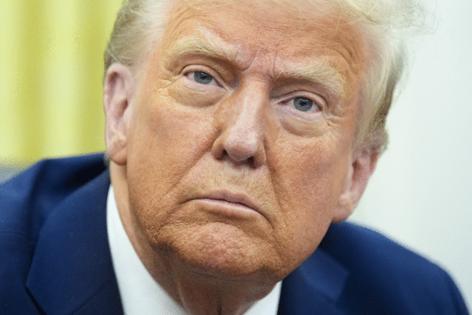Supreme Court to intervene on firing, Trump administration asks
Published in Political News
President Donald Trump asked the U.S. Supreme Court to let him fire the head of an independent U.S. agency that protects government whistleblowers, according to a person familiar with the filing.
The request, submitted Sunday but not yet formally docketed, marks the first time Trump has asked the high court for help in his bid to remake the federal government by removing officials who don’t embrace his views.
The filing asks the court to lift a temporary restraining order, issued by a federal trial judge in Washington, that shields Hampton Dellinger from being removed from his position at U.S. Office of Special Counsel for 14 days, according to a copy of the document reviewed by Bloomberg. The weekend rush to the Supreme Court followed a Saturday night order from a divided federal appeals court rejecting the administration’s intervention request as premature.
“This court should not allow lower courts to seize executive power by dictating to the president how long he must continue employing an agency head against his will,” acting Solicitor General Sarah Harris said in the Supreme Court filing.
The 2-1 appeals court decision said it would mark a “sharp departure” from normal court procedures to let the administration appeal the temporary order rather than waiting two weeks for a more fulsome trial court ruling. Two Democratic appointees formed the majority on the appeals court, while a Republican nominee dissented.
The dissenter, Trump-appointed Judge Gregory Katsas, wrote that it is “virtually unheard of” for a court to block the president from firing the head of an agency.
Under the Supreme Court’s normal procedures, Trump’s filing will go to Chief Justice John Roberts, who can either act on his own or refer the matter to the full court.
A Justice Department spokesperson did not immediately respond to a request for comment.
In issuing the temporary restraining order on Wednesday, U.S. District Judge Amy Berman Jackson said the firing “plainly” went against U.S. law. The administration didn’t provide any reason, even though federal law says the person in that position could only be removed “for inefficiency, neglect of duty, or malfeasance in office,” the judge said.
“This language expresses Congress’s clear intent to ensure the independence of the special counsel and insulate his work from being buffeted by the winds of political change,” Jackson wrote.
Trump has sought to transform the federal government since he took office last month, citing government efficiency as reason to dramatically cut the workforce, close agencies, slash spending and remove senior officials. His actions have drawn dozens of lawsuits challenging the moves as unconstitutional and unlawful executive power grabs.
Dellinger was nominated by former President Joe Biden to lead the special counsel office and was confirmed by the U.S. Senate in February 2024 for a five-year term. He is among several independent agency officials who are suing Trump over his push to oust them.
The case is Dellinger v. Bessent, 25-cv-385, U.S. District Court, District of Columbia (Washington). The Supreme Court case, Bessent v. Dellinger, hasn’t yet been assigned a case number.
_____
©2025 Bloomberg L.P. Visit bloomberg.com. Distributed by Tribune Content Agency, LLC.




























































Comments